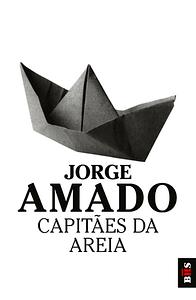Take a photo of a barcode or cover
Graphic: Alcoholism, Child abuse, Child death, Cursing, Death, Emotional abuse, Physical abuse, Racial slurs, Rape, Sexual content, Sexual violence, Suicide, Forced institutionalization, Police brutality, Grief, Death of parent, Murder, Abandonment, Alcohol
Amado faz com que estes meninos se entranhem em nós, põe-nos a torcer por eles, a sentir dó deles. Tenho a certeza que vou voltar a ler este livro só para visitar a vida dos capitães de novo.
The leaders of the Captains try to help and protect all the boys in the group, providing a ultimately good, but slightly skewed moral compass, as they are forced to survive in a city that rejects and persecutes them. They are not without friends, and father Don Pedro, Don’Aninha, Gods-Love and others help the children where they can.
They are hardly the downtrodden angelic poor however, the leader Pedro Bala, ‘Bullet’, in one scene effectively raping a young girl as she crosses the sands on her way home. He is racked with guilt afterwards, and while he has no excuse, there are moments when Amado pulls you back to realise how young they are, they are not fully formed adults, raised without guidance or parental influence. Indeed Legless, who uses his lame leg to con his way into rich houses, so he can scout them out and the let the Captains rob them, is torn when the owner of one of the houses takes him in and treats him as a replacement for her dead son. She treats him with the love that he has never had and always craved, and the conflict in him, when he feels like he has a chance to escape his life to one that seems better, at the price of abandoning the people who have been his family, is sharp, his thoughts confused and his decision almost leaves no hope for him.
The appearance of Dora into the Captains subtly changes the group, as she becomes a surrogate mother and sister, as well as lover to the orphaned boys. Eventually Bullet is captured and Dora put into an orphanage. After his escape and rescuing of Dora the group we have been following slowly breaks up. Professor leaves to learn to paint in Rio, Legless struggles to resolve the burning anger in him, Cat follows his lover to Ilheus and Lollipop follows his calling into religion.
While this is a little less polished than Amado’s later works, and the sense of Bahia itself is less pronounced, something that I found surprising given the theme of these novels and how strongly he evoked the place in his later books, I still enjoyed Captains. Amado doesn’t go in for the straight poor but good angle, but seems to truthfully try and reveal the life of all of Bahia, one facet of the soul of the city he has tried to evoke in his series. He portrays the life of the boys as a series of adventures, which fall on both sides of the law but ultimately which they participate in to survive, while each one dreams of escape, or of a maternal love they have never known. Legless is perhaps the most poignant story of them all, and his decision half way through the book was one that I genuinely couldn’t work out if there was a right or wrong answer. When you learn what happens to them as they grow older, they never seem to quite escape from their roots, no matter how far they get, and I think Amado does well to portray their life the full light of the Bahian sun.
(blog review here)
São criminosos, temidos pela gente da cidade, mas ao mesmo tempo, são crianças que sentem saudades da segurança e da felicidade de um lar e uma família. São sempre à procura de uma “mãezinha” e querem ir brincar no carrossel. Sem hipótese de viver como crianças, tornaram-se homens, mas não só homens: criminosos. Roubam viúvas, exploram pessoas simpáticas, lutam com navalhas e punhais. A personagem principal, com quem o autor pretende nos simpatizemos, até viola uma rapariga, o que é contado de maneira gráfica, e fica surpreendido quando depois ela o pragueja.
Ao longo dos meses, as personagens andam pelos seus percursos – há tragédia e redenção, mas o pano de fundo contra o qual o enredo se desenrola é a violência e caos na sociedade brasileira nos anos trinta do século XX, e o autor retrata esta sociedade muito nitidamente. É um livro virtuosístico.
(1) Entendi esta palavra como “armazém” mas ao que parece, tem um outro significado em PT-BR: um cais. Acho que armazém faz mais sentido neste contexto porque não consigo imaginar dezenas de pessoas a dormir num cais! Mas vou ver o filme em breve e espero entender melhor depois.
Graphic: Adult/minor relationship, Child abuse, Child death, Confinement, Death, Misogyny, Pedophilia, Physical abuse, Rape, Sexism, Sexual assault, Sexual violence, Suicide, Torture, Violence, Police brutality, Death of parent, Murder, Abandonment, Injury/Injury detail, Classism, Pandemic/Epidemic
“Uma voz de mulher canta a canção da Bahia. Canção da beleza da Bahia. Cidade negra e velha, sinos de igreja, ruas calçadas de pedra. Canção da Bahia que uma mulher canta. Dentro de Pedro Bala uma voz o chama: voz que traz para a canção da Bahia, a canção da liberdade. Voz poderosa que o chama. Voz de toda a cidade pobre da Bahia, voz da liberdade. A revolução chama Pedro Bala.”
Moderate: Rape
Ultimately though, I really liked this book, am glad I finally read it, and will at some point look forward to reading this in Portuguese. I bet a lot was lost in translation.
Graphic: Homophobia, Misogyny, Racism, Rape, Sexism, Sexual assault




